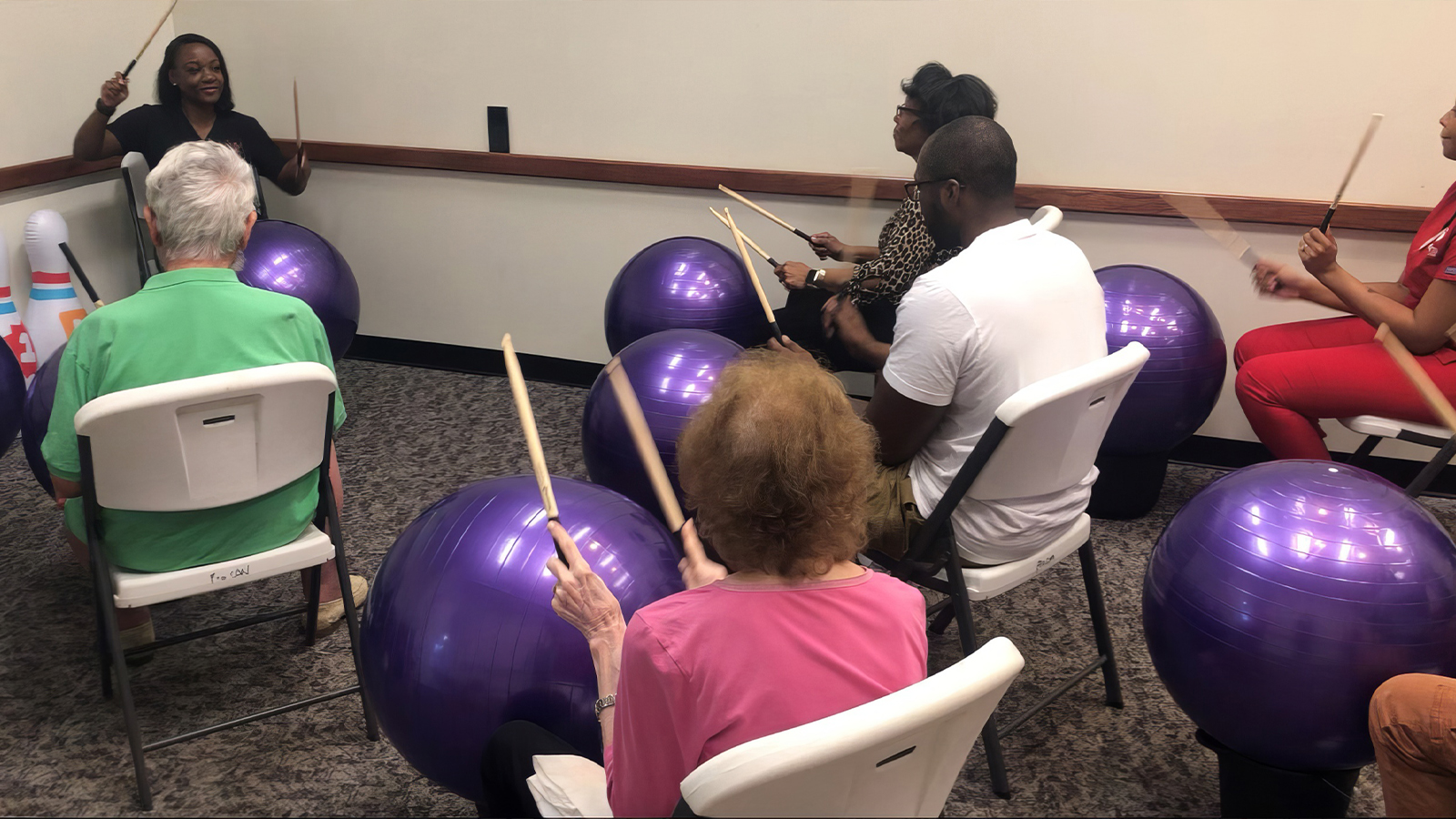Dementia Care: Exploring In-Home Care Options for Caregivers
Mar
31
2025
Caring for a loved one with dementia can be difficult and emotional. As the disease progresses, they require a higher level of care, needing assistance with daily tasks like bathing and dressing. You’re First Home Care, the trusted home care agency in Houston, Texas, offers comprehensive dementia care at home that supports both patients and families of people with dementia.
Millions of people in the U.S. care for individuals with dementia, including those with Alzheimer’s. Whether you’re in Texas or elsewhere, home care providers and home health services can relieve the stress of caregiving. They provide care tailored to the changing needs of people with dementia and their caregivers.
You’re First Home Care offers practical guidance for making the home dementia-friendly, managing daily challenges, and engaging in meaningful activities. This improves quality of life for both the patient and caregiver.
Key Takeaways
- In-home type of care options include companion services, personal care, homemaker services, and skilled nursing care.
- Creating a safe, dementia-friendly home and daily routine reduces anxiety and confusion. Consistency is key.
- Meaningful activities and social interaction improve mood and cognitive abilities.
- Caregiver support and self-care prevent burnout.
- Planning for future medical care ensures better outcomes and continuity of care.
Understanding Dementia and Its Impact on Caregivers
Dementia affects around 50 million people globally, with numbers expected to rise sharply. This highlights the increasing demand for quality long-term care and support for caregivers of people with dementia.

As dementia advances, individuals often need more hands-on assistance. Caregivers spend about 20 hours per week helping, leading to emotional and physical strain. Without the right care provider or resources, this responsibility can feel overwhelming.
The Challenges of Caring for a Loved One with Dementia
Caring for people with dementia requires patience, adaptability, and consistent attention. Challenges include managing difficult behaviors, ensuring safety, and maintaining emotional well-being. About 30% of dementia patients exhibit challenging behaviors.
“Caregiving for a loved one with dementia can be a lonely and isolating experience. It’s important to reach out for support and remember that you’re not alone in this journey.” – Sarah, caregiver for her mother with Alzheimer’s
As the condition progresses, home health aides or trained caregivers may be needed to meet new care demands. Safety concerns, managing incontinence, and increased nursing care needs can increase caregiver stress.
Accepting and Adapting to a Dementia Diagnosis
A dementia diagnosis is life-changing for patients and their families. Accepting this reality and finding the right home care providers can make all the difference. Caregiver support resources, respite care, and education help families adapt and stay strong throughout the journey.
Preparing Your Home for Dementia Care
With 5.8 million Americans living with dementia, it’s more important than ever to make homes safe, comforting environments. Proper preparation helps extend the time a person with dementia can remain at home.
Ensuring Home Safety for Individuals with Dementia
A dementia-friendly home reduces risk and stress. Removing tripping hazards, adding grab bars, and improving lighting can prevent accidents. Nearly 40% of dementia patients become disoriented in poor lighting conditions. Consistency in care is another important factor. If you use an in-home care provider, you don’t want a different person every day.
Using contrasting colors helps 75% of dementia patients navigate their environment more easily. These updates foster confidence and independence.
Equipping Your Home with Assistive Devices
Tools like adaptive utensils, memory aids, and communication devices help people with dementia maintain their independence. A staggering 90% of caregivers report an improved quality of life when such devices are in place.
By making thoughtful modifications and utilizing available technology, families can more effectively care for individuals with dementia in their own homes.
Exploring In-Home Care Services for Dementia Patients
Finding the right type of care can feel daunting, but home care providers can help personalize support based on your loved one’s needs.
Professional home health services like home health aides and CNAs assist with daily living activities. This kind of care—often referred to as memory care when focused on dementia—can be crucial for more advanced cases.
In-home dementia care typically costs around $30/hour. Full-time care may cost $5,720 monthly, while part-time support is roughly $1,950. Many families find this to be a more comfortable and cost-effective solution than transitioning to assisted living facilities.
Connecting with a Dementia Care Coordinator
Dementia care coordinators are vital. They help families understand their loved one’s complex care needs. They create personalized care plans and connect families with local resources.
Utilizing Adult Day Care Centers and Respite Services
Adult day care centers and respite services give caregivers a break. They provide a safe and engaging place for dementia patients. These services help prevent caregiver burnout and keep daily routines intact.
Hiring In-Home Care Providers and Home Care Services
In-home health aides and certified nursing assistants offer skilled care. They assist with daily activities and provide companionship. These professionals are trained to meet dementia patients’ needs.
When choosing in-home care, a home assessment is essential. Safety modifications like handrails and better lighting reduce accident risks. Exploring these options and working with a care team helps families care for their loved ones effectively. You’re First Home Care offers an in-home assessment which identifies what changes will help the person with dementia and their family have a better outcome.
Strategies for Effective Home Care for Dementia
Creating a safe and comfortable home for those with dementia is key. It’s about making a space that meets their needs. This includes making home dementia-friendly, engaging in activities, and handling behavioral and communication issues. This approach improves their life and reduces stress for caregivers.
Creating a Dementia-Friendly Home Environment
A dementia-friendly home is vital for safety and comfort. Simple changes like handrails and removing hazards help a lot. Labels and visual cues also aid in navigation.
Keeping the home calm and well-lit is also important. This reduces confusion and agitation. It makes the environment more soothing for those with dementia.
Engaging in Meaningful Activities and Social Interaction
Music therapy, puzzles, photo albums, and light physical activity help care for people with dementia by improving mood and cognitive function. Adult day care centers offer structured activities and social opportunities for those who need a change of pace.
Listening to music, looking at photos, or doing simple tasks are great.

Managing Behavioral Changes and Communication Challenges
Behavioral changes and communication issues are common in dementia. It’s important to be patient and understanding. Use simple language and stay calm. A person with Dementia will feed off your emotions and demeanor.
Avoid arguing or correcting. Adapt your communication style as their abilities change. This helps in managing these challenges effectively.
By using these strategies, caregivers can improve their loved ones’ lives. It also reduces their own stress. With support from organizations like the Alzheimer’s Association, caregivers can face dementia’s challenges head-on.
Caregiver Self-Care and Support
Caring for a loved one with dementia is tough. It can be emotionally and physically draining. It’s key to take care of yourself to avoid burnout and keep your care quality high. The National Institutes of Health notes that millions in the U.S. care for family or friends with Alzheimer’s, often alone.
Being a caregiver can harm your health. Studies show 46% to 59% of caregivers get depressed. They also face higher risks of chronic illnesses like high blood pressure and obesity. To fight these risks, doing self-care is vital.
- Walking for at least 20 minutes a day, three times a week
- Participating in physical activities like gardening to maintain endurance, balance, strength, and flexibility
- Visiting your physician at least annually to monitor your health
- Engaging in at least 30 minutes of physical activity, five days a week (even 10 minutes a day can be beneficial)
- Keeping a social life with friends, people who support you. Even if it’s meeting for lunch one time a month. It is important to keep your identity.
Seek out community support, respite care, and organizations like the Alzheimer’s Association for ongoing caregiver support. Getting help isn’t weakness—it’s wisdom.
Even though your home is a safe place, taking breaks is important. Look into community resources and care options like home care and respite care. By focusing on your well-being and getting support, you can care for your loved one better while keeping yourself healthy and happy.
Conclusion – Dementia Care at Home
In-home care for dementia offers a caring and tailored approach. It meets the special needs of both patients and caregivers. With the elderly population growing, and most dementia care happening at home, this care is vital.
By understanding the challenges and preparing the home, families can give their best care. They can explore care services and focus on their own self-care. This way, they can support their loved ones with dementia effectively.
Research shows that in-home care improves the well-being of those with dementia. It offers personalized help with daily tasks and keeps patients safe from injuries and infections. It also helps them stay connected with family and friends.
Creating a safe and engaging environment is key. This includes physical activity, mental stimulation, and proper nutrition. It helps maintain emotional and cognitive health for those with dementia.
You’re First Home Care services support families with care for dementia patients. Our team is dedicated to providing care for people with dementia. We help families ensure their loved ones receive the care they need at home.
FAQ – Long-Term Care for Dementia Patients
What are the unique challenges of caring for a loved one with dementia?
Caring for someone with dementia is tough. It includes managing their mood swings, fears, suspicions, keeping them safe/minimizing risks, and supporting their emotions. You also have to adjust to how the condition changes over time.
It can be hard to talk to them, make decisions, and take care of yourself. But it’s important to do all these things to help your loved one.
How can I create a safe home environment for my loved one with dementia?
To make a safe home for someone with dementia, remove things that could cause them to trip. Install grab bars and keep dangerous items out of reach. Make sure the lighting is good.
Use labels and visual aids to help them find things. Consider using special utensils and memory aids. Consistency and routine help minimize fear and frustration. These can help them stay safe and a sense of being independent.
What types of in-home care services are available for dementia patients?
There are many in-home care services for dementia patients. These include help with planning care, adult day care, and respite services. You can also hire independent health aides or certified nursing assistants; keep in mind independent individuals you are their employer.
These services help families deal with complex care needs. They give caregivers a break and provide skilled care for daily activities.
How can I engage my loved one with dementia in meaningful activities at home?
To keep your loved one engaged, think about what they like and can do. Encourage them to do things they enjoy, like hobbies or puzzles. Music, art, and reminiscence therapy can also be great.
Make sure the activities are fun and doable for them. This way, they can enjoy themselves and feel successful.
What strategies can I use to manage behavioral changes and communication challenges?
To handle behavioral challenges and communication issues, be patient and use simple words. Keep the environment calm. Validate their feelings and use nonverbal cues. Sit next to them or bend down, don’t stand over them. Standing over a person can be intimidating and make them feel they are not in control.
Have a daily routine and watch for things that might upset them. Offer comfort items or calm activities when needed.
How can caregivers prioritize their own self-care while caring for a loved one with dementia?
Caregivers need to take care of themselves too. Set boundaries, ask for help, and join support groups. Do things you enjoy and take breaks when you can. Make plans (and keep them) with a friend even if it’s one time a month.
Use exercise, hobbies, and relaxation to stay well. Don’t be afraid to ask for help. Respite care can give you a much-needed break.
Reach Out






